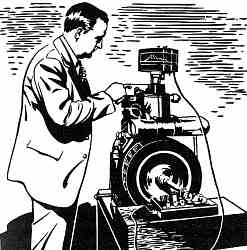|
This
young man joined one of our Engineering Departments in 1916.
Ever since we had put the self-starter on the automobile, engineers
were inclined to blame the engine knock on the battery ignition which
was part of the starter. About 1913 we had done some work on the cause
of this difficulty but for the lack of time it was laid aside. Midgley
and a group of us talked this over one Saturday at lunch and I said
"Why don't you get the old apparatus out of my closet and see what you
can find out?"
 Engine knock in those days was supposed to be caused by either ignition or carbon. Our preliminary studies had showed that there was more to it, so the first job that Midgley did was to devise a means of determining just what it was. The old indicator I had used was not satisfactory so for several months he developed an optical device in which a light beam traced a line on a screen showing the changing pressures in the engine. The copies of the first such diagrams are treasured in our archives. |








